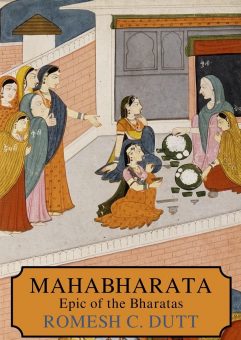Book VIII. Bhishma-Badha (Fall of Bhishma)
[296] All negotiations for a peaceful partition of the Kuru kingdom having failed, both parties now prepared for a battle, perhaps the most sanguinary that was fought on the plains of India in the ancient times. It was a battle of nations, for all the warlike races in Northern India took a share in it.
Duryodhan’s army consisted of his own division, as well as the divisions of ten allied kings. Each allied power is said to have brought one akshauhini troops, and if we reduce this fabulous number to the moderate figure of ten thousand, including horse and foot, cars and elephants, Duryodhan’s army including his own division was over a hundred thousand strong.
Yudhishthir had a smaller army, said to have been seven akshauhinis in number, which we may, by a similar reduction, reckon to be seventy thousand. His father-in-law, the king of the Panchalas, and Arjun’s relative the king of the Matsyas, were his principal allies. Krishna joined him as his friend and adviser, and as the charioteer of Arjun, but the Vrishnis as a nation had joined Duryodhan.
When the two armies were drawn up in array and faced each other, and Arjun saw his revered elders and dear friends and relations among his foes, he was unwilling to fight. It was on this occasion that Krishna explained to him the great principles of Duty in that memorable work called the Bhagavat-gita which has been translated into so many European languages. Belief in one Supreme Deity is the underlying thought of this work, and ever and anon, as Professor Garbe remarks, “does Krishna revert to the doctrine [298] that for every man, no matter to what caste he may belong, the zealous performance of his duty and the discharge of his obligations is his most important work.”
Duryodhan chose the grand old fighter Bhishma as the commander-in-chief of his army, and for ten days Bhishma held his own and inflicted serious loss on Yudhishthir’s army. The principal incidents of these ten days, ending with the fall of Bhishma, are narrated in this Book.
This Book is an abridgment of Book vi. of the original text.
I. Pandavs routed by Bhishma
Ushas with her crimson fingers oped the portals of the day,
Nations armed for mortal combat in the field of battle lay,
Beat of drum and blare of trumpet and the sankha’s lofty sound,
By the answering cloud repeated, shook the hills and tented ground,
And the voice of sounding weapons which the warlike archers drew,
And the neigh of battle chargers as the arméd horsemen flew,
Mingled with the rolling thunder of each swiftly-speeding car,
And with pealing bells proclaiming mighty elephants of war!
Bhishma led the Kuru forces, strong as Death’s resistless flail,
Human chiefs nor bright Immortals could against his might prevail,
Helmet-wearing, gallant Arjun came in pride and mighty wrath,
Held aloft his famed Gandiva, strove to cross the chieftain’s path!
Abhimanyu son of Arjun, whom the fair Subhadra bore,
Drove against Kosala’s monarch famed in arms and holy lore,
Hurling down Kosala’s standard he the dubious combat won,
Barely escaped with life the monarch from the fiery Arjun’s son!
With his fated foe Duryodhan, Bhima strove in deathful war,
And against the proud Duhsasan brave Nakula drove his car,
[298] Sahadeva mighty bowman, then the fierce Durmukha sought,
And the righteous king Yudhishthir with the car-borne Salya fought,
Ancient feud and deathless hatred fired the Brahman warrior bold,
Drona with the proud Panchalas fought once more his feud of old!
Nations from the Eastern regions ’gainst the bold Virata pressed,
Kripa met the wild Kaikeyas hailing from the furthest West,
Drupad proud and peerless monarch with his cohorts onward bore
’Gainst the warlike Jayadratha chief of Sindhu’s sounding shore,
Chedis and the valiant Matsyas, nations gathered from afar,
Bhojas and the fierce Kambojas mingled in the dubious war!
Through the day the battle lasted, and no mortal tongue can tell
What unnumbered chieftains perished and what countless soldiers fell,
And the son knew not his father, and the sire knew not his son,
Brother fought against his brother, strange the deeds of valour done!
Horses fell, and shafts of chariots shivered in resistless shock,
Hurled against the foeman’s chariots speeding like the rolling rock,
Pages: 1 2 3 4 5 6 7 8 9 10 11 12 13 14 15 16 17 18 19 20 21 22 23 24 25 26 27 28 29 30 31 32 33 34 35 36 37 38 39 40 41 42 43 44 45 46 47 48 49 50 51 52 53 54 55 56 57 58 59 60 61 62 63 64 65 66 67 68 69 70 71 72 73 74 75 76 77 78 79 80 81




